

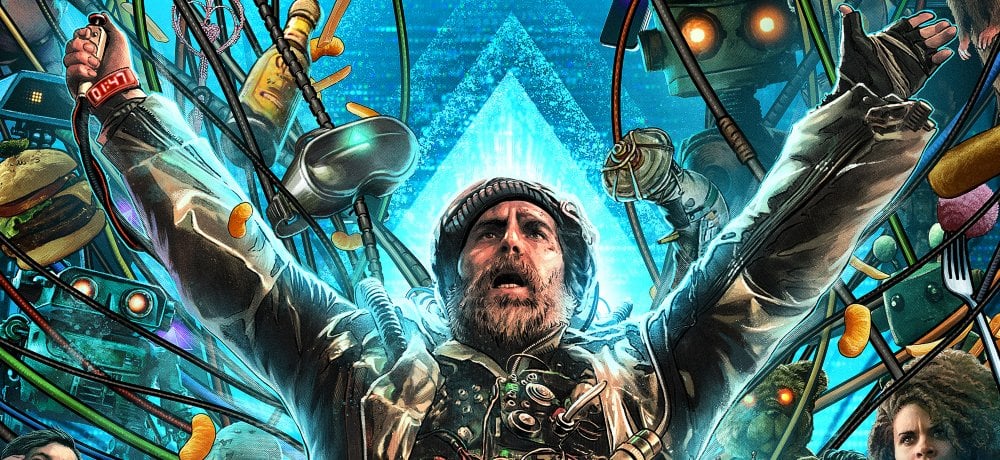
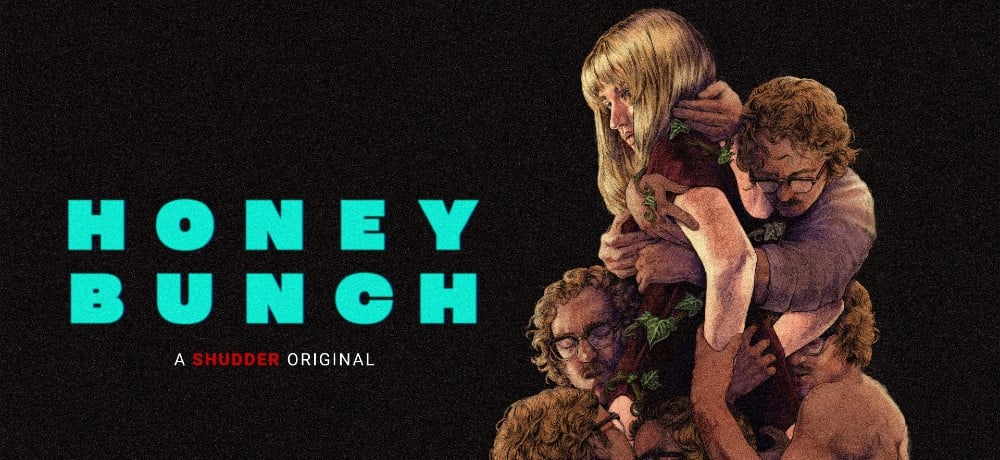
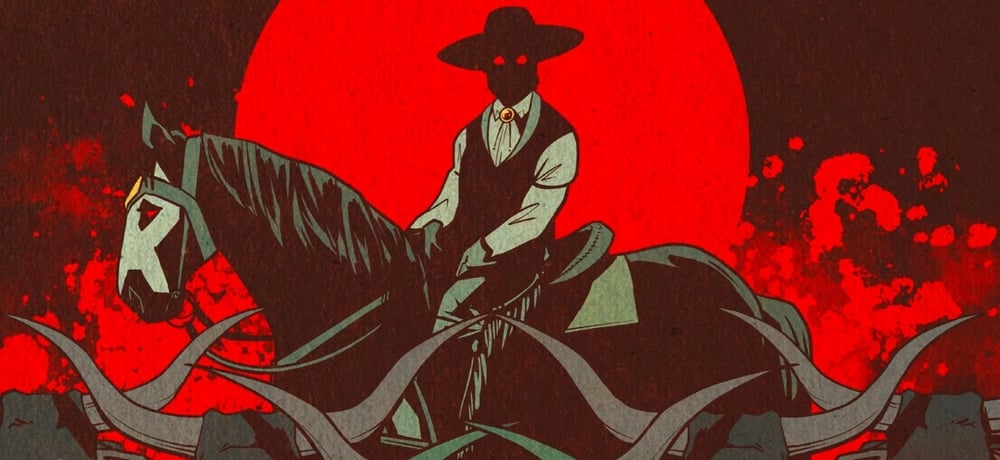
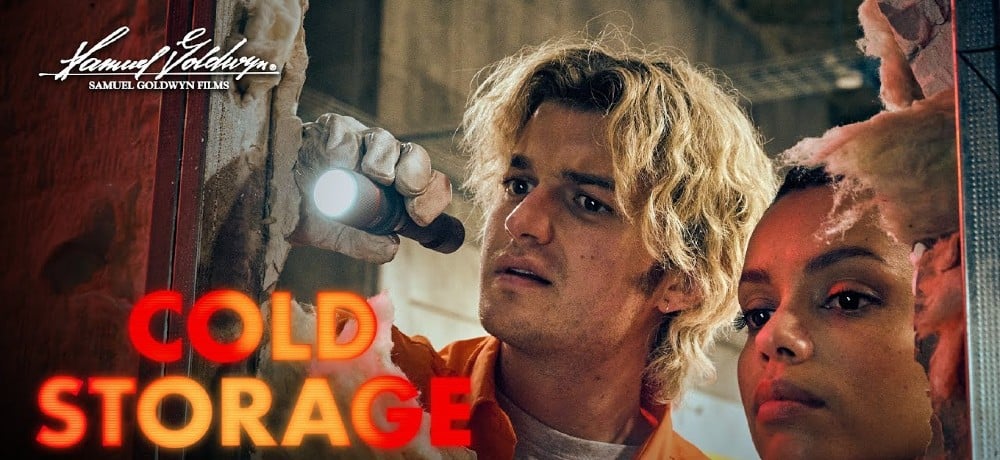
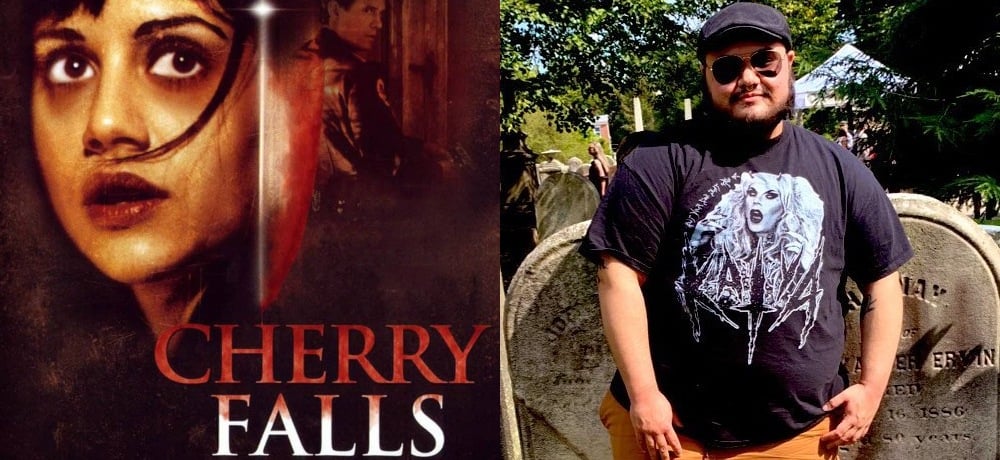
Welcome back to Let’s Scare Bryan to Death, and doing the honors of introducing me to a new (to me) horror movie this month is Dax Ebaben, a fellow Philly/Jersey boy who has bylines at Bloody Disgusting, Film Cred, and Gayly Dreadful. Podcast listeners may also recognize him from Watched Once, Never Again, a show Ebaben co-hosts with previous LSTBD guest Mary Beth McAndrews to discuss movies too dark or disturbing to allow for repeat viewings. Their tagline, “We’re traumatizing ourselves so you don’t have to,” is basically made for softies like me who are intrigued by the darker corners of horror but don’t have the emotional fortitude to visit them too often.
Fortunately, Ebaben isn’t taking me too far down a traumatizing rabbit hole for this month’s movie. Instead, he’s leading me through a portal into a magical slasher realm where having pre-marital sex may prevent your death as opposed to causing it. That’s right, we’re diving into Geoffrey Wright’s 2000 cult classic, Cherry Falls.
Taking place in the small town from which the film takes its name, Cherry Falls follows Jody Marken (Brittany Murphy), a delightfully awkward girl navigating high school, a breakup with her pushy boyfriend, Kenny (Gabriel Mann), and her overbearing sheriff father, Brent (Michael Biehn). When someone starts murdering Jody’s fellow students, it soon becomes apparent that the killer is targeting virgins. While Sheriff Marken investigates the culprit (while quietly connecting it to a dark secret in the town’s past) the students at the high school start planning a bacchanalia while Jody starts getting closer to her English teacher, Mr. Marliston (Jay Mohr). (As always, here is your blanket SPOILER WARNING for the film, as we’ll be diving into important plot points moving forward).
Now, I’ll be honest, I hadn’t even heard about Cherry Falls when it first came out, which I suppose shouldn’t be too surprising given that after several attempts to get the film through the MPAA, the studio gave up and sold the film to air on television. Dax, was this one you saw when it first came out, or did you find out about it later as well?
I found out about this much later! I was about 9 or 10 when it came out in 2000. I was watching horror movies by then, but this seems to have been pretty obscure until recently, so I don’t think I would have caught it back then. It’s only in the last few years that I heard about it, which is truly wild given my huge crush on Brittany Murphy (RIP) when I was a kid. I knew she had done some near-genre work, but I was surprised when I found out she had done a proper slasher. It’s such a 2000s teen scream gem in all the best ways!
The late, great Murphy really is amazing in this movie, giving us Weird™ in a movie that consistently demands Weird™. At first, I thought the odd tone and erratic performance were missteps, but I soon realized that everything that first reads as accidental comes together to be something very deliberate to give us a slasher by way of Twin Peaks. What’s your take?
I just think it’s very distinctly early 2000s in style, at least aesthetically. Maybe it’s from coming of age in that time period, but I love seeing that strange, sometimes disorienting, often over-the-top shooting style. It brings back warm memories, I guess, and lends to the camp factor. And the music! I love it. As for performances, they’re sometimes all over the place, probably because I think the actors thought they were in all different movies. But Brittany Murphy is consistently great, arguably better than the movie even deserved her to be. She’s got a genuine vulnerability that makes the movie feel more high stakes than it would if just about anyone else were in her role. I can get behind that Twin Peaks comparison, for sure. It’s a weird f*ckin’ town with weird f*ckin’ people (no pun intended).
This town is indeed chock-full of weird people, my favorite being the brief appearance from a pre-Happy Endings Zachary Knighton as a random kid who’s apparently known for confessing to any high-profile crimes in the town. But I have to ask, given the arguments and brawls that break out among the parents at the emergency meeting where Sheriff Marken revleals that the killer is targeting virgins, might Cherry Falls beat out Nightmare on Elm Street for the title of Worst Parents in a Slasher Film?
In my opinion, yes! At least in NOES the parents were trying to protect the children by taking Freddy out (which is why they feel guilty, leading to alcoholism, etc). In Cherry Falls, the adults are just trying to protect their own crimes, or the knowledge they have about it. The parents at the meeting are more worried about having to tell their children about sex and possibly needing to encourage them to have it, as well as the perception of promiscuity for girls, than about the actual killer. They’re worried about their own feelings. They suck! It’s like, “Sorry you’ll have to be uncomfortable for two minutes, but your children could be killed.”
Sexuality certainly plays a big role in the film, both in how the teens navigate the perception that they need to have sex to stay alive and in how the murders tie back to a sexual assault perpetrated years ago against a girl name Laura Lee by prominent men in the town, including Sheriff Marken. In her book The 1990s Teen Horror Cycle, Alex West discusses the interesting ways the film explores sexual dynamics. One aspect that she picked up on, that I thought maybe I was crazy for noticing, is that there’s a hint at sexual tension between Jody and her father, such as when he’s teaching her self-defense and the scene lingers on a moment when they’re on the ground together. Did you notice that, and do you see it as a part of the larger conversation the film has about sex?
I absolutely noticed that and I’m so glad you brought it up because I wanted to talk about it. I think most people seeing this movie for the first time with no prior knowledge or context, probably feel strange for picking up on an incestuous undertone between Jody and her father. It’s so unexpected and is never really addressed in the movie at any point, but I do think it’s part of the larger conversation explored in the film. You kind of see it with Jody’s mother, too. She and Jody share a kiss on the lips that lingers a little too long for comfort. As for Jody and her dad, I would guess their sexual tension is a perversion of the idea of the protective father, at least at first. But then it comes to light that he was part of the gang rape that instigates the events of the film, and it turns out that nope, he’s not just a perversion of the protective father trope, he’s an actual creep.
Something I really appreciate about this movie is its larger conversation doesn’t just seem to be about sex, in my opinion, but about sex and power linked together. The teenage girls assemble to teach each other the ins and outs (no pun intended) of sex and how to protect and advocate for themselves. They also feel empowered to take charge, often making first advances towards the boys rather than the other way around as is usually depicted. Relatedly, when Jody’s mother tells her about the gang rape at the hands of a group of popular boys including her father, she mentions that people likely wouldn’t have cared that a drunk girl “had sex with” a bunch of drunk boys at a party. Jody, emboldened (as highlighted by the camera looking up towards her as opposed to straight on), soberly retorts, “You said it was rape.”
She’s giving Laura Lee back the power of her choice to say “no” and the presumption that she’s telling the truth. To zoom back out, I think this uncomfortable relationship between Jody and her father highlights a few of the issues the film tries to tackle, like power dynamic and self-empowerment through sexual autonomy, as well as to have a healthy distrust of authority. Normally I would wonder if I’m “reaching” with these assessments, but I truly think Cherry Falls endeavors to question sexuality as depicted in other teen slashers of its time.
While the film subverts a number of tropes, there’s one that it runs headlong into, as we discover that Mr. Marliston is not only the killer, but also Sherrif Marken’s son and the product of Laura Lee’s sexual assault. Marliston is looking to take his vengeance both for what happened to his mother and for the abuse he suffered from her due to her trauma. But given that Marliston dresses in women’s clothing when he kills his victims, we once again see a character’s genderqueer identity being conflated with abuse and deviancy.
Admittedly, I find myself conflicted with Marliston’s representation in the film because it’s such a harmful trope, with a cis-hetero man playing cross-dressing for scares and laughs. Yet at the same time, Marliston becomes so compelling in the final act, not because the cross-dressing is scary, but because I have to admit Mohr kind of pulls off the look and has such great line readings such as his confident response to being asked why he’s wearing lipstick: “Because it makes me feel pretty.” How did you feel about Marliston’s portrayal?
To me, it’s one of the few really big missteps in the film. The other huge one, in my opinion, is that Jody never gives her dad up for being a rapist, but I guess that just means the town’s secrecy and corruption lives on even after Marliston is dead. I just talked myself into being okay with that choice now. As for the problem at hand, I just think it’s an all-around bad choice. I understand the point of the cross-dressing. I get that it’s supposed to show that he’s unhinged and obsessed with how his mother treated him after he was born, but I always think it’s a dangerous game equating cross-dressing or trans-ness with obsession, insanity, murder, the result of abuse, etc.
And then apart from the potential to be offensive, it’s also like… Hitchcock already did this. You’re probably never going to do anything as good as, or better than, he did. Nor is it likely that any other cross-dressing reveal will be as shocking. So what’s the point? I think a teacher abusing his power to access students in order to lure them in and/or kill them is a pretty scary concept on its own. Or maybe have him wear a different creepy costume. Or just have him be genderqueer throughout! I know that was a somewhat new concept to most folks at the time, but not totally unheard of. There are no rules against having a non-binary and/or trans person be the villain. It’s whether or not you portray their gender identity as villainous that matters, in my opinion. In this case, Marliston’s cross-dressing is supposed to be part of his nefariousness, which is uncool to me and takes away from some of the magic of the movie.
It’s definitely a huge stumble for a movie that seems to be getting so much right. But like you, that ending with Jody keeping her dad’s secret also gave me pause, because it seems like such an odd pivot from Jody’s refusal to allow her mom to change the narrative of what happened to Laura Lee. Jody seems like she wants to break this story open, but then at the end she decides not to tarnish her father’s legacy. Do you think the film is asserting that Jody’s decision is a noble one, or do you think this was an intentional decision by Wright and screenwriter Ken Selden to show that the town’s corrupted view of sex and power continues to lurk in the shadows? I’m wondering to what degree this movie is intentionally intelligent about its discussion of sexual dynamics versus how it may have stumbled into a few astute observations?
I don’t think the film endorses Jody’s choice to cover for her dad. The river in the final shot turns red after Jody leaves the police station, which I think is a pointed way of saying this town will continue with its disgraceful pillars safely in power. As for the idea of the filmmakers stumbling into a few astute observations, I think that’s possible, though I can’t be sure. It’s possible that Selden wanted to write a slasher that subverts all the usual tropes, which would accidentally have created something that challenges conservative sexual convictions. However, it seems to me that whether this was originally serendipitous or not, the filmmakers lean into it. The movie has to be intentionally intelligent about the sexual politics at play, at least to some extent. I think it would have fallen really flat otherwise.
Returning to the misstep with Marliston’s portrayal, that serves as a good jumping off point for my standard question about the viability of a remake. Do you think Cherry Falls needs a remake? If so, how would you tweak the story to address the genderqueer aspects in a better way or would you scrap that element entirely?
I don’t think it NEEDS a remake, but it could be interesting nonetheless. It may be difficult to try to capture that same magic of the original Cherry Falls, given its distinctly 2000s aesthetic and alt-rock soundtrack (could use some more nu metal, in my opinion). The cross-dressing is used as a way to disguise the killer and throw off suspicion, so I guess a remake would need a completely different disguise that fully covers the killer’s face and body (honestly, the Ghostface costume would be perfect). If I were remaking the movie, I don’t know how I’d treat the cross-dressing aspect or whether I would keep it in. Maybe I’d make the teacher genderqueer (or a drag queen, or just a guy who wears whatever clothes he likes, I guess) in their daily life before being revealed as the killer. Like I said, I think queer characters can and should be villains sometimes, but their evilness needs to be separate from their gender identity. I guess some people would still argue in that case that the teacher’s queerness could be misconstrued as monstrous, but hopefully most would appreciate the nuance there.